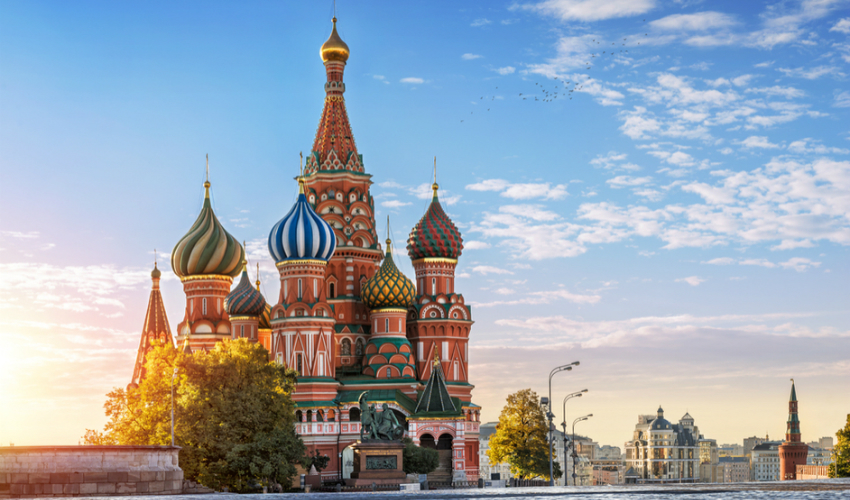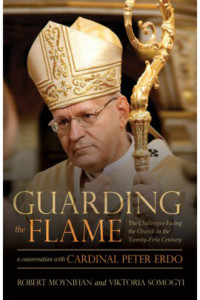Monday, July 15, 2019

Above, St. Basil’s Cathedral at the end of Moscow’s Red Square in the center of the city
Writing from Moscow, on a cool day in mid-July.
I have been here about 20 times in the last 20 years.
I have had the privilege to come to know Russian Orthodox Patriarch Kirill and Metropolitan Hilarion, and Roman Catholic Archbishop Tadeusz Kondrusiewisz and Paolo Pezzi, and so many others.
These visits and all that has concerned these relationships have seemed like living twice — because of the veil of myth and mystery associated with Soviet Russia, and pre-Soviet Russia, and the great hopes and tragic failures of these generations.
The city of Moscow itself — after a Rome with dumpsters overflowing with trash — seems very clean, almost sparkling. Not a cigarette butt or gum wrapper in sight.
The crowds walking in Red Square seem to be mainly families with children. The thought that there would ever be a war on these people, a nuclear exchange, seems nightmarish.
We are here with our Urbi et Orbi Foundation on our 6th annual pilgrimage to Russia and eastern Europe.
Our goal is to try to build bridges of understanding between separated Christians, especially between Catholics (us) and Orthodox (whether in Russia or Ukraine or Greece or Istanbul) — separated since 1054, the date of the “Great Schism.” We would like to help lay the possible foundation for further steps — already taken by so many others in so many ways — to overcome the schism and reunify the eastern and western “lungs” of Christianity.
And as a corollary, we would like to do what little we can to assist in establishing friendships which may play some small role in improving relations between the United States and Russia.
My own motivation is largely personal, something that dates back to my childhood and has to do with the stories I heard of the message of Fatima. The thought, the hope, is that faith returns and flourishes in these regions, and that from that, peace is deepened and flourishes throughout the world.
Our thought for 20 years now has been to observe, to see what has happened to the former Soviet Union and East bloc, in political and cultural terms, but especially in terms of Christian faith.
We now have several projects our Foundation supports, especially an annual two-week exchange between Moscow and Rome of a dozen young people, who over the next 50 years will have perhaps a role to play in deepening inter-Church understanding.
We also are proposing that the Russian people open a Russian Academy in Rome, similar to the American Academy in Rome (of which I am a former fellow), the British School of Rome, and the Ecole Francaise de Rome. But there is no Russian Academy in Rome.
In Rome, Gian Maria Vian, a patristics scholar and former editor of the Osservatore Romano and President of the Committee that overseas all of the foreign academies in Rome, has said to me that no single action could do more to deeply tie Russia into the cultural life of the West than opening a Russian Academy in Rome.
I have a meeting on this topic now…
(end, Letter #40: From Moscow to Rome)
Special Note to Readers: Consider sponsoring the Moynihan Letters as the need for an independent view (my view) on events in the Church is becoming increasingly important, as today’s news shows (here is a link to the donation page: link). Your support is the only way I can stay independent. A monthly donation of even just $2.50 — a cup of coffee — would be deeply appreciated, and helpful. —RM
 Guarding the Flame: A Conversation with Cardinal Peter Erdo
Guarding the Flame: A Conversation with Cardinal Peter Erdo
A book containing several days of interviews I conducted with Cardinal Peter Erdo of Hungary has just been published by TAN (Thomas A. Nelson) Books, which specializes in the important work of reprinting traditional Catholic works now out of print. To purchase a copy of my new book with Cardinal Erdo, you may do one of three things:
(1) Go to the publisher’s website (link)
(2) Go to the Amazon website and order the book there: (link)
(3) Write back to me by return email, including a complete mailing address and phone number, tell me how many copies you would like, and I will send you one or more signed copies at the cover price of $27.95, plus shipping and handling (about $5 inside the US, but considerably more, up to $26 or more, outside of the US).—R
Where is the Catholic Church going?
Guarding the Flame: The Challenges Facing the Church in the Twenty-First Century: A Conversation With Cardinal Peter Erdő
By Robert Moynihan and Viktoria Somogyi
How will the Church face the challenges of the 21st century? Do the recent advances in modern technology pose a threat to the human soul?
In this wide-ranging, candid conversation, Cardinal Péter Erdő, Archbishop of Budapest, Hungary, one of the most respected cardinals in the Catholic Church, speaks with Dr. Robert Moynihan, founder and editor of Inside the Vatican magazine, about the Catholic Church’s place in an increasingly secularized world.
As the two-time president of the Council of the Episcopal Conferences of Europe, Erdő is the leading bishop of Europe. And as Europe has descended into a deep secularism—more pronounced and rapid even than in the United States—Erdő is uniquely positioned and qualified to identify and tackle the issues that secularism presents.
Here, for the first time in in one place, the cardinal speaks forthrightly about the need to “guard the flame” of the traditional Christian faith in the face of all temptations and obstacles. Guarding the Flame is a courageous call to remain faithful to the faith handed down from the Apostles, whatever the cost.
Cardinal Péter Erdő, Archbishop of Esztergom-Budapest and Primate of Hungary, was born in Budapest on 25 June 1952, the first of six children. He was created Cardinal by Pope John Paul II in 2003. He has published more 250 articles and 25 books on Canon Law, as well as other spiritual works.
Robert Moynihan (Harvard College, B.A.,1977 and Yale University, Ph.D., 1988) founded Inside the Vatican magazine in 1993. He has covered the Vatican and Church affairs for more than 30 years and is the author of books on Pope Benedict XVI and Pope Francis.
Viktoria Somogyi, born in Hungary, has lived and worked in Rome at the Hungarian language desk of Vatican Radio. She studied International Relations at the University of Rome.










Facebook Comments